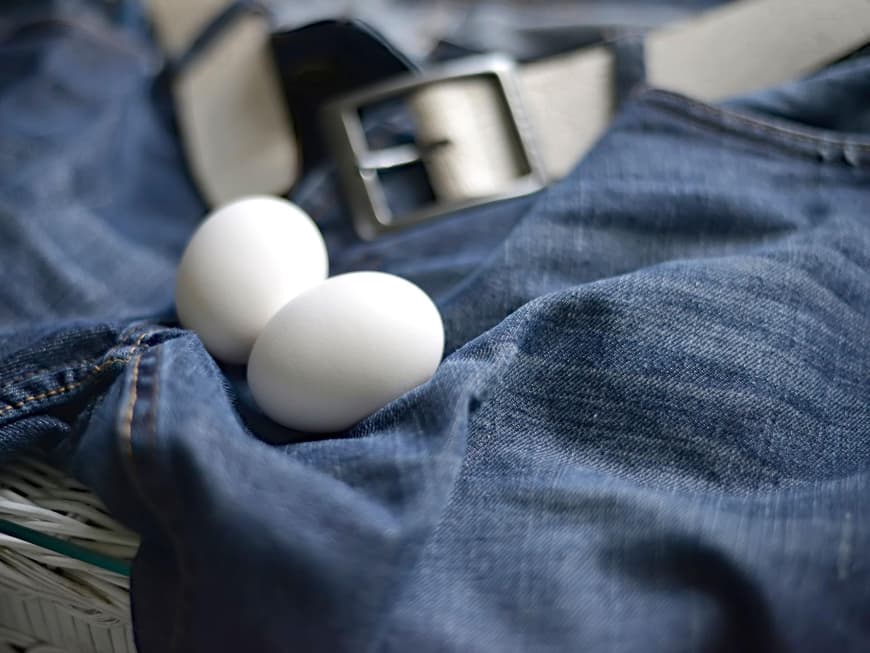
We saw how taboo this part of the body is in the media's outrage after Jogi Löw's trouser grab during Euro 2016. What headlines there weren't! In the tension of the event, Löw only did what many men do when they feel unobserved: Reassure themselves of their own masculinity, feel if everything is still ok down there, reassure themselves with their own scent. But do you know exactly why he actually needs these little things? And why they are more than just a part of the male sexual organ?
No manhood without testicles
The testicles could be considered THE seat of masculinity, as this is where the majority of the male sex hormone testosterone is produced. It is primarily this hormone that, during the first few weeks of pregnancy, turns the initially undifferentiated fetus into a baby with male sexual characteristics such as testicles, scrotum and prostate.
If the hormone cocktail is missing, various forms of intersex syndrome occur. This is when a person carries parts of both sexes or cannot be clearly assigned to one sex. However, other causes can also contribute to this.
During puberty, the testicles play the biggest part in turning a boy into a man.
- Body hair increases.
- The shoulders become broader.
- The larynx grows and makes the voice deeper.
- The facial features become more angular.
- Last but not least, the sexual organs also grow
- and fertile sperm mature.
From the early/mid forties, the testicles become somewhat lazier and gradually produce less testosterone. This results in fewer sperm, causes the scrotum to shrink or leads to a bad mood. When exactly the process begins and how it affects each man is different. If serious problems occur, testosterone can be prescribed by a doctor.
Location of fertility
Boys can have erections and orgasms even before puberty. However, the testicles only produce sperm from puberty onwards. Until then, they shoot with air. The same applies to men who have their vas deferens cut as part of a vasectomy as a method of contraception. The sperm continue to be produced in the testicles, but no longer enter the ejaculate.
Now you might ask yourself why the testicles are actually outside the body. After all, they are very sensitive. All men who have ever been hit in the privates, whether on purpose or not, know this. I recently saw a video of Australian Olympic snowboarding champion Torah Bright trying to hit a golf ball straight, hitting the cameraman to her right right on the twelve. Oooooh. In the body, the testicles would definitely be safer from such attacks.
But inside, unfortunately, it's too warm. Sperm thrive best at a temperature that is two to three degrees below body temperature. This is the only reason why they dangle outside the body in their padded scrotum. Parents' forums are asking whether the testicles overheat in the plastic diapers and whether this could affect the ability to conceive later on. Whether there is actually a connection does not seem to have been researched to date. However, as more and more couples are resorting to artificial insemination, we should not lose sight of this.
What if the testicles are not in place?
Testicles lie in their scrotum. For very practical reasons, one hangs higher than the other, as they would otherwise bump into each other. They are also usually slightly different in size. So everything is completely normal and no cause for concern.
When a boy is born, it may be that one or both testicles are not in the place intended for them, but in the inguinal canal or in the abdominal cavity. This is known as undescended testicles. This is not that unusual, as the testicles do not move from the abdomen down into the scrotum until the seventh month of pregnancy. In around one to three percent of newborns and 30 percent of premature babies, this process is either not yet complete or has been delayed en route. Parents discuss with their doctor which treatment methods should be used as early as possible. Surgery or accidents can also lead to undescended testicles at a later stage.
What does not count towards this diagnosis, however, are testicles that disappear during sexual arousal or in cold weather. In both cases, the scrotum contracts and thus clamps the testicles tightly to the body. In the first case, nature has arranged this well to protect against injury and in the second case to use the body's own heating system.
Loss due to testicular cancer
Unfortunately, I also have a less pleasant point. Like all organs, testicles can also be affected by disease. Testicular cancer is the most common tumor disease in men under the age of 40. However, at 1.6 percent of all new cancer cases, it is still rather rare. Expressed in concrete figures, we are talking about 4000 people affected compared to 34,000 people affected by lung cancer. A small consolation may be that often only one testicle is affected. Thank goodness there are two, so that even if they are removed, the ability to procreate can be preserved.
However, it is possible that ejaculation, orgasm and erection are impaired by the nerve damage. And of course there are also psychological problems. There are special implants that are inserted into the scrotum for visual and tactile reasons. On the other hand, we have a survival rate of up to 99 percent. Now that's something!
So if a man is between 20 and 40 years old, he should take the time to have his testicles thoroughly palpated every now and then. This is best done during a long shower or in the bath. If there is a change in the size of the testicles or in the form of nodules, then it is high time to see a doctor.
Anja Drews - qualified sex educator for ORION
Sources: YouTube / Beier, K.M. et al: Sexual Medicine, p. 65 / Briken, P., Berner, M.: Praxisbuch Sexuelle Störungen, p. 154 f / netdoktor.de / krebsgesellschaft.de






